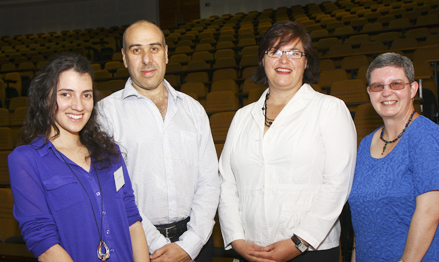Latest News Archive
Please select Category, Year, and then Month to display items
21 August 2019
|
Story Thabo Kessah
|
Photo Thabo Kessah
 Keafon Jumbam is gearing herself for the institutional Three Minute Thesis competition.
Keafon Jumbam is gearing herself for the institutional Three Minute Thesis competition.
Keafon Jumbam is a PhD candidate whose research on food and foxes has won her the first prize of R8 000 in the recent Faculty of Natural and Agricultural Sciences’ Postgraduate Flash Fact Competition. Her brief in the competition was to
summarise her research in three minutes, using only one static slide.“The competition started at departmental level on both campuses. The idea was that the best student in each department is then selected to go for the faculty-level competition on the Bloemfontein Campus. Summarising the entire research into three minutes is no easy feat, but a great way to gauge how well one has mastered your work,” she said.
Far-reaching research
“Thought-provoking presentations on research, ranging from technology to track academic progress, traditional medicine as alternatives to expensive prescriptions, and suggesting insects as food alternatives to curb hunger in this era of severe droughts and food shortages. The competition was tough, but it highlighted the level of research competitiveness on the Qwaqwa Campus. I hope that more students will join in such opportunities to build themselves up and to showcase our research output as Qwaqwa students,” added Jumbam from the
Department of Zoology and Entomology.
Institutional finals
Her next challenge is the institutional competition to be held on 23 August 2019, which could qualify her for the national competition.
Workshop looks at new communities in the Free State and Gauteng
2013-11-08
 |
At the PARI workshop were, from the left: Laura Phillips, researcher at PARI, Prof Ivor Chipkin, CEO of PARI, Prof Corli Witthuhn, Vice-Rector: Research and Dr Tania Coetzee, Senior Lecturer in the Department of Political Studies and Governance.
Photo: Hannes Pieterse
08 November 2013 |
The university, in cooperation with the Public Affairs Research Institute (PARI), recently presented a workshop on new communities in the Free State and Gauteng. A variety of subjects, which explored the anthropology, sociology and history of the two provinces, were debated at the workshop. Discussions were held on the challenges faced by new communities, with the socio-economic and religious aspects of new communities coming under scrutiny. Environmental issues and responsibilities also came under fire and speakers agreed that individuals need to get involved in the community and that they should do something to address the housing and food shortage in South Africa.